Our May blog post about the Flame restaurant got us thinking about other bygone eateries.
Signs and souvenirs are among the last physical remnants of many former fixtures on the Las Vegas dining scene. Here are four of the most beloved Las Vegas dining institutions represented in The Neon Museum’s collection.
Alpine Village Inn
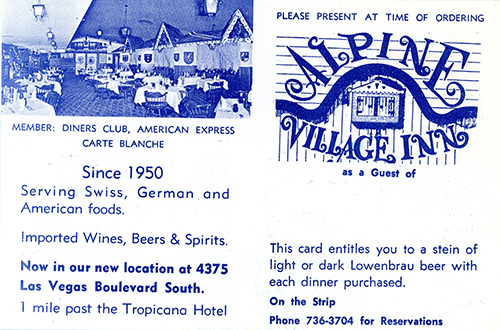
The Alpine Village Inn opened in 1950 and moved locations four times before arriving at its final location at 3003 Paradise Road in 1970. The peripatetic purveyor of German and Swiss cuisine remained the place for Old World food and fun until it closed in 1997. Wait staff clad in lederhosen and dirndls served diners under a miniature tramway which ran across the room. Finicky eaters were forewarned, “On our menu are no gimmicks.” The hearty full-course meals included a relish bowl, crackers with seasoned cottage cheese spread, four kinds of bread, “Chicken Supreme” soup served in an individual pewter kettle, salad, entrée with a choice of vegetable and potato, dessert and a beverage. Downstairs in the raucous Rathskeller, patrons sang along with an oom-pah band, learning German from “Der Schnitzlebank.” Informality was encouraged at the Rathskeller, which irreverently asked guests to, “Kindly deposit peanut shells on the floor so as not to clutter tables.”
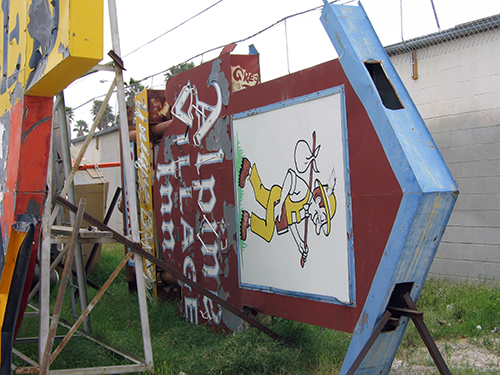
Alpine Village fans still trade recipes online, particularly for two of the most popular dishes: the restaurant’s signature Chicken Supreme soup and seasoned cottage cheese spread.
Green Shack
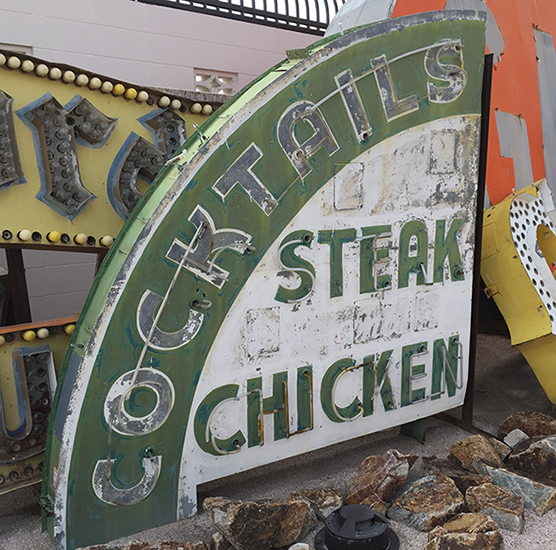
The Green Shack was a longtime locals’ favorite, operating for nearly seven decades along East Fremont Street and Boulder Highway. In 1929 or 1930, founder Mattie “Jimmie” Jones started the Colorado, which saw her selling fried chicken and bootleg whiskey out of her home. Sometime between 1930 and 1932, the restaurant moved into a relocated, green railroad barrack, where Jones fed men working on the Boulder (now Hoover) Dam. Later, the Green Shack became a gathering spot for locals, as well as some famous visitors. Frank Sinatra and Dean Martin reportedly dined there, as did “Bugsy” Siegel, who was said to have been a regular customer during the construction of the Flamingo. The atmosphere was country casual, complete with wagon wheels and a hitching post. Fried chicken was the specialty of the house, made in the original cast iron skillets. Chicken livers and gizzards were also available, either separately or as a giblet combination plate. “Homemade” bread pudding was a popular dessert, but the recipe remains a closely guarded family secret. The Green Shack was added to the National Register of Historic Places in 1994, but sadly closed in 1999 and has been torn down.
House of Lords Steak House
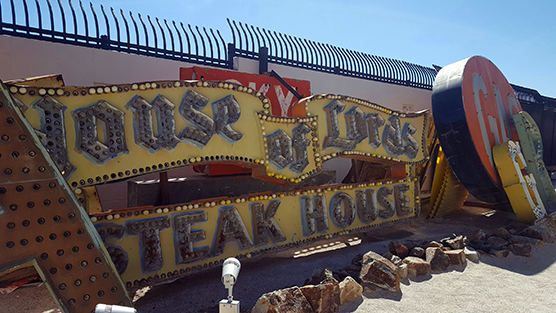
Located inside the Sahara Hotel and Casino, the House of Lords first opened in 1954. In its day, it was among the top gourmet rooms on the Strip. The original Old English décor featured red wallpaper, wood paneling, coats of arms and leather seating. Menus at one point were printed on a paper scroll. The early dress code required men to wear a jacket and a tie. The room was popular with members of the Rat Pack and other celebrities, who often came to unwind after their shows. Former partners Dean Martin and Jerry Lewis together with pal Frank Sinatra celebrated there following the duo’s famous television reunion at the Muscular Dystrophy Telethon in 1976.
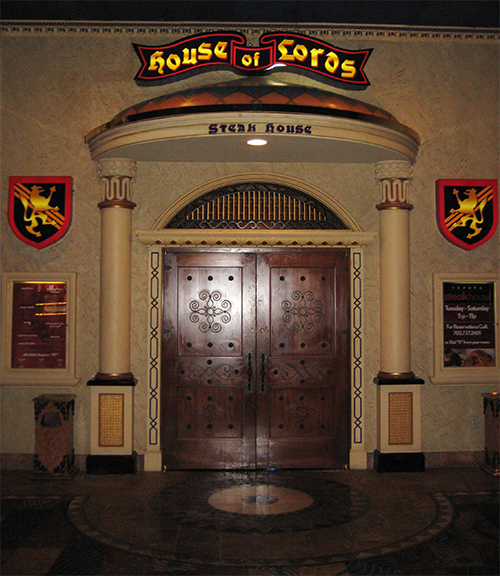
The restaurant was known for its prime rib and stuffed lobster but the staff also prepared special dishes for regulars and celebrities. The restaurant received several makeovers over the years, the final remodel coming shortly before the hotel’s closure in 2011. The last version of the room drew from the Sahara’s past, featuring Arabesque style booths and oversized photos of the Rat Pack, the Beatles, Tina Turner and Sonny and Cher.
Venetian Ristorante/Slanted Clam
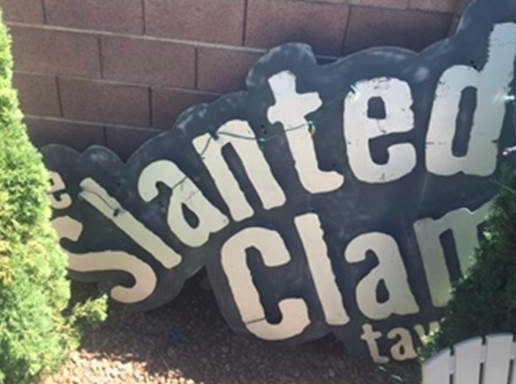
This location has been home to many dining spots, including two owned by local restaurant royalty.
Sisters Angie Ruvo and Maria Perry, together with their husbands Lou and Al, opened the Venetian Pizzeria on Fremont Street in 1955. What might be the city’s first pizza restaurant began with just nine tables. In 1966, the Venetian moved to a larger space on West Sahara Avenue and became the Venetian Ristorante. The distinctive façade, which featured brick and stucco palazzos, was added in 1978. Food was freshly prepared on-site. Each week, the kitchen served up 90 pounds of meatballs, 150 pounds of sausage and hundreds of loaves of bread. Maria’s recipe for neck bones was said to be a favorite of Frank Sinatra. “Mama” Maria retired from the Venetian in 1971 but soon returned to the restaurant business to open the enduring Bootlegger Bistro with her daughter, singer and politician Lorraine Hunt-Bono. Angie sold the Venetian in 1997 following Al’s death three years earlier. Their son is noted businessman and philanthropist, Larry Ruvo.
Eight years after the Venetian closed, another family of restaurateurs purchased the property. The DiMartino family has been a fixture in local dining since 1973 when it opened DiMartino’s Family Deli. Mark DiMartino later operated the upscale Tillerman restaurant. In 2003, he started a chain of sports pubs called the Tilted Kilt, first opening at the Rio Hotel. Two years later, DiMartino brought the Slanted Clam to the former site of the Venetian Ristorante. The beach style bar and restaurant lasted only three years, becoming a Mexican restaurant in 2008. Today, Herbs and Rye operate on the premises.
Which Las Vegas restaurant do you miss most? Let us know on Twitter! #LasVegasHistory #RestaurantsWeLoved
